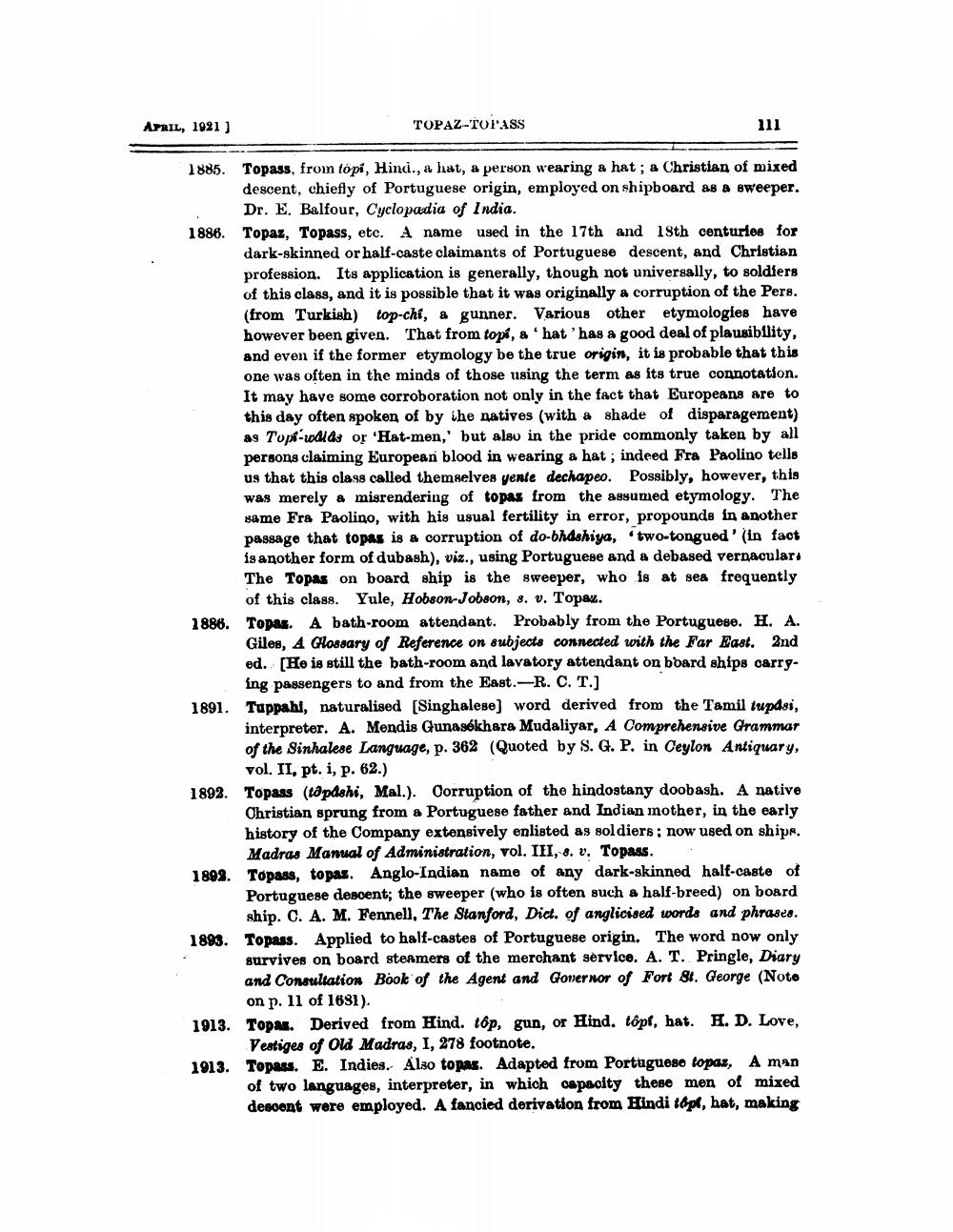________________
APRIL, 1921)
TOPAZ-TOPASS
1885. Topass, from topi, Hindi., a hat, a person wearing a hat; a Christian of mixed
descent, chiefly of Portuguese origin, employed on shipboard as a sweeper.
Dr. E. Balfour, Cyclopadia of India. 1886. Topaz, Topass, etc. A name used in the 17th and 18th centuries for
dark-skinned or half-caste claimants of Portuguese descent, and Christian profession. Its application is generally, though not universally, to soldiers of this class, and it is possible that it was originally a corruption of the Pers. (from Turkish) top-chi, a gunner. Various other etymologies have however been given. That from topi, a 'hat'has a good deal of plausibility, and even if the former etymology be the true origin, it is probable that this one was often in the minds of those using the term as its true connotation. It may have some corroboration not only in the fact that Europeans are to this day often spoken of by ihe natives (with a shade of disparagement) as Topi-dids or 'Hat-men,' but also in the pride commonly taken by all persons claiming European blood in wearing a hat; indeed Fra Paolino tells us that this class called themselves yente dechapeo. Possibly, however, this was merely a misrendering of topaz from the assumed etymology. The same Fra Paolino, with his usual fertility in error, propounds in another passage that topas is a corruption of do-bhdshiya, "two-tongued' (in fact is another form of dubash), viz., using Portuguese and a debased vernacuları The Topas on board ship is the sweeper, who is at sea frequently
of this class. Yule, Hobson-Jobson, 8. v. Topa. 1886. Topaz. A bath-room attendant. Probably from the Portuguese. H. A.
Giles, A Glossary of Reference on subjects connected with the Far East. 2nd ed. (He is still the bath-room and lavatory attendant on board ships carry
ing passengers to and from the East.-R. C. T.] 1891. Tuppahi, naturalised (Singhalese) word derived from the Tamil tupdsi,
interpreter. A. Mendis Gunasókhara Mudaliyar, A Comprehensive Grammar of the Sinhalese Language, p. 362 (Quoted by S. G. P. in Ceylon Antiquary,
vol. II, pt. i, p. 62.) 1892. Topass (tapdshi, Mal.). Corruption of the hindostany doobash. A native
Christian sprung from a Portuguese father and Indian mother, in the early history of the Company extensively enlisted as soldiers ; now used on ships.
Madras Manual of Administration, vol. IH, 8. v. Topass. 1899. Topass, topaz. Anglo-Indian name of any dark-skinned half-caste of
Portuguese descent; the sweeper (who is often such a half-breed) on board
ship. C. A. M. Fennell, The Stanford, Dict. of anglicised words and phrases. 1893. Topass. Applied to half-castes of Portuguese origin. The word now only
survives on board steamers of the merchant service. A. T. Pringle, Diary and Consultation Book of the Agent and Governor of Fort St. George (Noto
on p. 11 of 1881). 1913. Topa. Derived from Hind. top, gun, or Hind. tôpf, hat. H. D. Love,
Vestiges of Old Madras, I, 278 footnote. 1913. Topass. E. Indies. Also topax. Adapted from Portuguese topaz, A man
of two languages, interpreter, in which capacity these men of mixed desoont were employed. A fancied derivation from Hindi topl, hat, making




